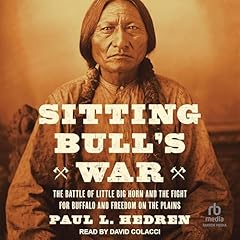
Rosebud, June 17, 1876
Prelude to the Little Big Horn
No se pudo agregar al carrito
Add to Cart failed.
Error al Agregar a Lista de Deseos.
Error al eliminar de la lista de deseos.
Error al añadir a tu biblioteca
Error al seguir el podcast
Error al dejar de seguir el podcast
Prueba gratis de 30 días de Audible Standard
Compra ahora por $24.28
-
Narrado por:
-
Douglas Rye
-
De:
-
Paul L. Hedren
The Battle of the Rosebud may well be the largest Indian battle ever fought in the American West. The monumental clash on June 17, 1876, along Rosebud Creek in southeastern Montana, pitted George Crook and his Shoshone and Crow allies against Sioux and Northern Cheyennes under Sitting Bull and Crazy Horse. It set the stage for the battle that occurred eight days later when, just 25 miles away, George Armstrong Custer blundered into the very same village that had outmatched Crook. Historian Paul L. Hedren presents the definitive account of this critical battle, from its antecedents in the Sioux campaign to its historic consequences.
Rosebud, June 17, 1876 explores in unprecedented detail the events of the spring and early summer of 1876. Drawing on an extensive array of sources, including government reports, diaries, reminiscences, and a previously untapped trove of newspaper stories, the book traces the movements of both Indian forces and US troops and their Indian allies as Brigadier General Crook commenced his second great campaign against the northern Indians for the year. Both Indian and army paths led to Rosebud Creek, where warriors surprised Crook and then parried with his soldiers for the better part of a day on an enormous field. Describing the battle from multiple viewpoints, Hedren narrates the action moment by moment, capturing the ebb and flow of the fighting. Throughout, he weighs the decisions and events that contributed to Crook’s tactical victory, and to his fateful decision thereafter not to pursue his adversary. The result is a uniquely comprehensive view of an engagement that made history and then changed its course.
The book is published by University of Oklahoma Press. The audiobook is published by University Press Audiobooks.
“With Rosebud, Paul Hedren further cements his place as the leading historian of the Great Sioux War of 1876-1877.” (Nebraska History)
©2019 University of Oklahoma Press (P)2020 Redwood AudiobooksLos oyentes también disfrutaron:




















Las personas que vieron esto también vieron:






Very good listen.
Se ha producido un error. Vuelve a intentarlo dentro de unos minutos.
Lots of detail
Se ha producido un error. Vuelve a intentarlo dentro de unos minutos.
Well written Narrative of a forgotten battle
Se ha producido un error. Vuelve a intentarlo dentro de unos minutos.
A strained effort, for battle planning nerds only
Se ha producido un error. Vuelve a intentarlo dentro de unos minutos.


